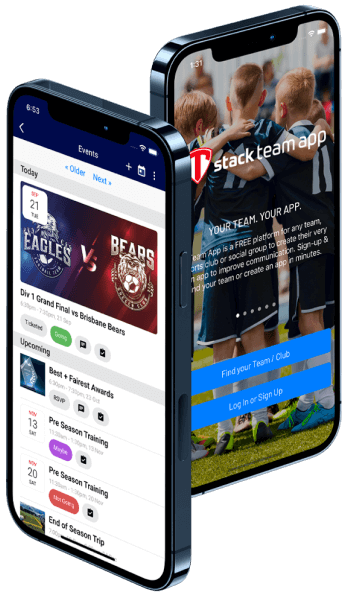From the Coach's Desk
FROM a coach's perspective, selection is the hardest and most emotive aspect of the job.
We have seen in recent weeks the selection of the three national teams that are representing Australia at the upcoming Olympic and Paralympic games.
As always when teams are selected, people outside the inner sanctums of the team wish to voice an opinion and express their own ideas about who should have made it, who could have made it and who was hard done by.
The following is a hand out given to me early on in my coaching career which was put together by some of coaching elite minds.
It has served me very well, and I believe it applies to all of levels representative basketball.
Subjectivity is an unavoidable element of selection
Fundamental to developing a team to match your vision is the assessment of a player's worth to a team. The best players don't automatically combine to form a great team.
Success depends on getting the right players with the right skills, attitude and motivation.
You want fit, skilled, self motivated, committed, loyal players…but by far and away the greatest attribute an athlete can bring to the team is persistence.
As a coach you must make a commitment to improve the player in the best interests of the team and their personal and professional development.
For me there is a general checklist;
- Physical qualities –athletic skills
- Sport specific skills
- Mental strength –
- Flexibility and versatility
- Team orientation
- Current form
- Past record
- Special qualities
First you need to see a lot of the player - in training and competition.
You must determine their goals, ambitions, motivation and what they can contribute to the culture of your team also their capacity and desire to improve.
Assess the player's current position and standing and look at their long-term options.
And of course there is the X-factor; sometimes a player will give you something that statistical data and video analysis cannot.
In practical terms, making selection decisions will necessitate difficult decisions on a daily/weekly basis.
Clearly, the coaches are in the best position to pick the best team (not necessarily the best individuals) to get the job done.
The coach’s recruitment practice of renewing his squad by routinely moving older players and replacing them with developing talent leaves little room for sentimentality. (Wayne Bennett NRL, Kevin Sheedy AFL)
Your recruitment process must clearly involve sustainability planning and will obviously challenge players and their supporters who may not see the logic or fairness.
Subjectivity is the greatest enemy of selection acceptance and perhaps reflects a wider issue that the individual has become more important than the team itself.
No-one is irreplaceable. Sentimentality fades quickly if improvements are obvious.
I am attracted to players who are prepared to make sacrifices to achieve theirs and the team goals.
TEAM SELECTION
Selection guidelines:
Physical qualities: Speed is paramount. Foot-speed and quickness can cause opponents to play conservatively and forces them to adjust strategies. It also allows players to take greater risks. The other essential physical quality is strength.
Strength underpins explosive power and is translated into a ‘physical presence’ providing acceleration, agility, and balance. Strength and power are critical components but should not exclude the athlete who has developed aspects of their game to compensate and may come under the criteria of special qualities; ability to read the game, superior skills (shooting/ball handling/passing), physical courage etc. Speed however is a commodity that is essential.
Sport Specific Skill: Highly refined fundamental skills should be identified and sought after. Particularly specific skills that will enable the team to be better rounded and more able to cope with conditions at this level.
Shooting, passing dribbling, rebounding and defensive skills of a superior level are a vital ingredient in the development of confidence and assertiveness of the athlete and therefore the team.
Mental strength: Mental strength encompasses a range of attributes which go into a player’s ability to reproduce their skills in the cauldron of competition. I call it an ‘elite mentality’. Having composure, dealing with adversity and organising and disciplining yourself to be properly prepared are the qualities which I define as an elite mentality. We want athletes who can overcome adversity, be it in defeat, injury or illness, non-selection, poor form, personal problems.
We want athletes who have the courage to express themselves but at the same time will be willing to put the team’s good ahead of the their personal wishes or ambitions, to manage their frustrations for their own good and the good of the team.
Finally we want athletes who will demand of themselves the best preparation to compete, who understands that it is their demeanour and discipline that will infect the team in a positive way. Attitude builds aptitude.
Flexibility and versatility: Players should look at versatility as an asset that can make them indispensable to the team. ‘bigs’ who can play and defend on the perimeter, ‘smalls’ who can take their man inside can value add to the team. The ability of all players to run the floor is essential.
Without flexibility teams are too predictable and cannot cope with new and different problems or replace absent, out of form or injured players.
Team orientation: Complex integrated teams require co-operative, co-ordinated actions both continually and spontaneously. For the athlete their primary goal must be the success of the team, they must have a commitment to the co-operative endeavour of their team. Mutual respect, absence of blame and affection are the characteristics of a ‘we’ team.
These are skills that can be developed. However we want players who will fit within the group because the influence is beneficial and positive. That they are able to contribute to the team dynamic that augments performance is critical.
Current form: It is rare that a player with sustained meagre form will have a form reversal in the heat of tough competition. Form slumps of short duration are common and quality players will turn this around.
Relevant mitigating circumstances such as injury and illness can affect performance and cause temporary form losses however such slumps in quality players are not terminal. Consideration of current form is of vital importance to selection as it is a strong indicator of confidence and enthusiasm.
Past record: A record of previous good performances in major competition or in conditions of adversity or when athletes have been under pressure should be taken into account. However past performance must be measured against current form. The calculation of merit in such cases requires fine judgment and should focus on the player’s ability to perform well in pressure situations.
Special qualities: Some athletes have qualities that are hard to quantify or categorise. They can be physical, mental or emotional. Leaders, warriors, players who want to be in the play, players who have the capacity to change to complexion of the game or the ability to nullify an opponent are examples of the special qualities to look for in the selection process.
Leadership should be encouraged in every player. Some athletes display leadership by their attitude and demeanour at training and in games. By their approach they can lift the quality of training or competing by infecting their teammates with enthusiasm. When all players contribute in this way this is a leaderful team.
Happy selecting!
Ben Ettridge
Wolves MSBL Head Coach











Comments
Comment Guidelines: The SportsTG Network is made up of players, families and passionate sports followers like you who have a strong opinion about sport. That's great - we want you to have your say and share your thoughts with the world. However, we have a few rules that you must follow to keep it fun for all. Please don't be rude, abusive, swear or vilify others. Apart from some pretty serious sport sanctions, we also can ban you and report you if things get out of hand. So play fair and have fun, and thanks for your contribution.